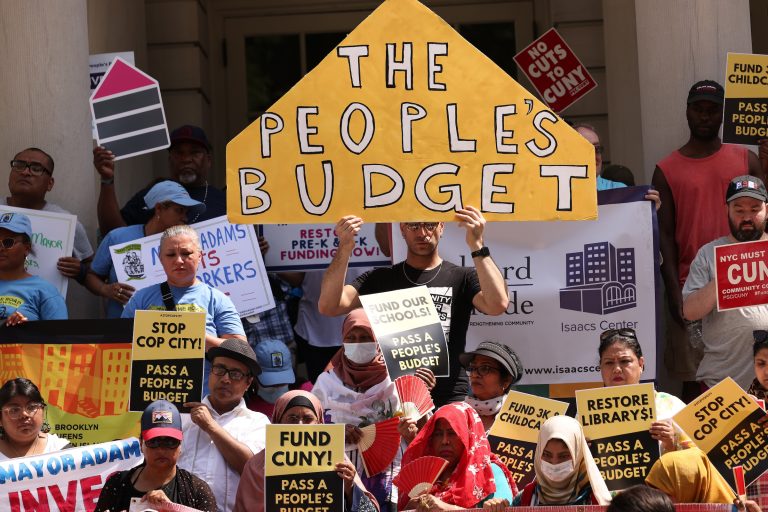Updated: June 28, 2024 at 11:00 AM ET: On the evening of June 27, after this article was published, New York City Mayor Eric Adams and Council Speaker Adrian Adams announced a comprehensive restoration of funding for libraries and cultural institutions, restoring $58.3 million in funding to the City’s three public library systems and $53 million in funding to the Cultural Institutions Group and Cultural Development Fund recipients. DCLA’s total budget has not yet been released.
Mayor Eric Adams and the City Council will release the city’s adopted budget for fiscal year 2025 by July 1, following a year of spending cuts that drew strong opposition from institutional leaders, City Council members and cultural advocates. The cuts have resulted in reduced programming at cultural institutions such as the Museum of the City of New York, Carnegie Hall and the Queens Museum, raising concerns about the cultural sector, which generates more than $110 billion in revenue each year.
In a last-ditch effort outside City Hall last week ahead of the budget deadline, city councilors called on Adams to allocate $53 million to the Department of Cultural Affairs (DCLA) and restore all spending cuts to the Cultural Institutions Group (CIG) and the Cultural Development Fund (CDF), which awards grants to more than 1,130 mostly smaller organizations across the city. While the mayor’s office partially restored some of those cuts in April, it did not address the November cuts; cultural advocates are calling for the restoration of those funds ($7.9 million) and an additional $45.1 million on top of the executive baseline budget.
Adams’ proposed executive budget, released April 24, allocates $151 million for DCLA. (The final budget is expected to be much higher because it will include City Council initiatives and negotiated funding that were not included in the mayor’s draft executive budget.) City Comptroller Brad Lander noted that the plan affects the 34 agency members of the CIG and CDF. According to Lander’s report, the CIG still faces a $6.5 million cut in fiscal year 2025 and $6.6 million in annual funding cuts thereafter; the CDF also faces a $1.4 million baseline cut starting in fiscal year 2025.
Lisa Gold, director of the Asian American Artists Alliance (A4), told Allergic Despite the arts organisation’s 41-year history, its funding has “not been immune” to recent CDF budget cuts, with this year’s CDF grant down 5 per cent from last year.
“Unlike several organizations that have seen funding cut entirely, A4 will find ways to make up the difference,” Gold said. “However, this cut means we will fund 30 fewer artists, and those artists will serve between 300 and 15,000 fewer New Yorkers.”
Gold added: “Due to the enduring effects of systemic racism, organizations like ours that are led and serve people of color often do not have the same endowments or large, wealthy patrons as predominantly white institutions, making it easier to survive budget cuts.”

The action is in response to a May 10 open letter written by members of the Cultural Equity Coalition of New York City (CECNY), which includes the Latino Arts Alliance of New York City (LxNY), A4, Dance/NYC, Indiespace, and ART/New York. The letter has been signed by at least 432 New York City arts and cultural workers. CECNY estimates that without the $6.5 million CDF, New York City cultural organizations will lose at least 130 full-time employees and “countless community arts spaces.” Combined, CECNY estimates that 3,250 artists will lose opportunities to work on public projects.
Before the budget deadline of June 27, Gotham People It remains to be seen whether there will be good news for cultural funding, with the report saying that libraries will reverse major funding cuts and return to seven-day operations.
In addition to funding cuts, members of the arts and culture community have expressed concerns about recent revisions to the CDF, including adjustments to the current peer review that determines how its grants are distributed. Currently, members of the city’s arts and culture community, recruited by DCLA, score organizations’ CDF applications to determine their grant amounts. The new revisions will allow the department to “adjust awards above the minimum award” and provide grants to applicants who “do not meet the minimum award score.”
Some community members said the amendment could make the grant distribution process more equitable for smaller organizations that lack the resources to compete for city funds.
Lauren Gibbs, a former CDF launch panelist and current advocate for the nonprofit cultural community, told Allergic She still has many questions about the purpose of the minimum award changes, given the panel process currently in place.
“I hope to better understand why these changes are being proposed at this time,” Gibbs continued, adding that the changes would only make the peer review process “less democratic, less effective,” and instead give DCLA leaders more power to “make their own award decisions and adjustments to awards.”
“The nonprofit cultural sector deserves more, not less, openness, transparency and disclosure about proposed changes in fund development and allocation before any hasty decision is made to amend its charter,” Gibbs said.

